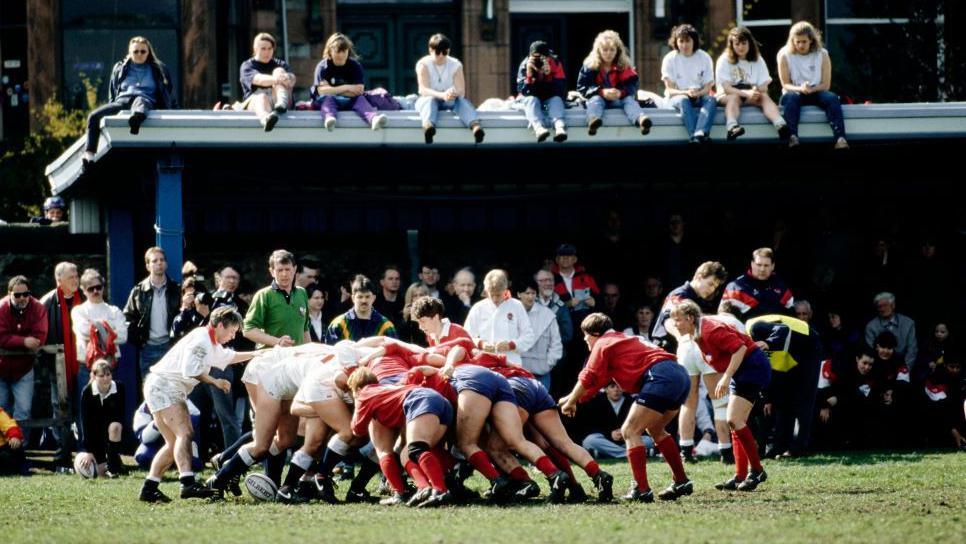England's trailblazing 1994 World Cup winners

The 1994 World Cup final was played at Raeburn Place, the home ground of Edinburgh Academical, and the venue for the first rugby international between Scotland and France in 1871
- Published
Who has lifted the Rugby World Cup for England?
Ask most that question and most will go straight to Martin Johnson in 2003 and others might add Katy Daley-McLean in 2014.
However, before those famous victories, England were crowned champions of the world in a game that deserves greater fanfare.
In 1994, Karen Almond captained England to a first World Cup triumph with a 38-23 victory over the United States in Edinburgh.
"Depending on which of the newspaper reports you read, anywhere between 5,000-7,000 were there that day," recalled Gill Burns, who played in the final for England at number eight.
"People were on the roofs, on balconies and sitting in the park on the hill watching."
The women who saved the rugby world cup
- Attribution
- Published13 April 2024
1994 World Cup Special: 30 years on
- Attribution
England's 1994 world champions: Where are they now?
- Published24 April 2024
The fight for recognition
This was the second Women's World Cup following the United States' victory over England in 1991.
Both were called the World Championship because the International Rugby Board (IRB) - now known as World Rugby - did not recognise the first two editions of the tournament.
That finally changed in 2009 - with the help of Burns' mother, who created an album from her daughter's playing days that helped prove the tournament's legitimacy.
"I kept most stuff and my mum was really good at organising," Burns told BBC'S Rugby Union Weekly.
"I knew it would be special and a treasure one day. I kept tickets, programmes and little things that don't mean anything at the time."
England were nearly denied the opportunity to avenge their 1991 final defeat after the IRB prevented the Netherlands from hosting the 1994 competition, as problems with global recognition continued.
However, Scotland stepped in late in the day to save the tournament.
"Thank goodness for Sue Brodie and Sandra Colamartino and the women's players who said 'we need to save this World Cup'," Burns added.
"We were so lucky to be able to fulfil that dream of going to another World Cup and facing the United States, who we knew we could beat, and we will forever be in the debt of those girls who made it happen."
With the tournament confirmed, travel, food and accommodation had to be sorted by the players and staff themselves because of the amateur nature of the sport.
"It was wonderful to be an England player," said Burns. "But it was professionalism with a small 'p'."
Giselle Mather, who played at centre in the final, was a teacher at Orleans Park School in Twickenham and remembers raffle tickets being advertised in her school assembly to help fund the travel and accommodation.
"It was incredible. The kids came in the next day with their parents' ticket money so we could afford the trip," Mather added.
"The last assembly before I left there was so much support for me. I was given time off to go and massive support."
30 years on - England players reminisce 1994 World Cup win
'I was permanently bruised'
The World Cup in 2022 lasted five weeks. Burns and Mather's schedule was much more compact with their five games being played across 18 days.
Wins over Russia and hosts Scotland in the pool stage were followed by victories over Canada and France in the knockout rounds. There was precious little time to overcome any niggles before the final.
"I was permanently bruised and aching, but it was something you were used to," Burns recalled.
"I don't remember letting myself feel achy or negative in any way."
The World Cup final in 1991 finished 19-6 to the United States, with a large portion of the England squad returning three years later determined to avenge that defeat.
Burns, centre Jacquie Edwards and full-back Jane Mitchell scored tries and in addition to two penalty tries victory was secured to spark chaotic scenes of celebration.
"At the full-time whistle I fell to the ground because I was so exhausted," said Burns.
"The crowd then ran on. There were no barriers or stewards and they were belting me over the head as I was kneeling on the floor. By the time I got to my feet the pitch was full.
"I got my medal and found the girls and held the trophy aloft."
That evening the England players were invited to a banquet with the other 10 nations, where they celebrated into the early hours of the morning until an unexpected fire alarm finally ended their night.
But the moment that Mather remembers most fondly is being on the BBC's flagship sports programme Grandstand to watch highlights of the game.
"We got 15 minutes on it and it showed the tries. It was incredible," she recalled.
"I was blown away to be on the sports show that I had watched as a little one going 'I want to do that' one day."
The original trophy was lost for 15 years until a Rugby Football Union for Women administrator found a wooden box tucked away in their loft.
It has since returned to Twickenham, where the players of 1994 met last Saturday to watch the Red Roses defeat Ireland in front of a crowd of 48,778.
It was a moment that signified how their victory 30 years earlier helped change the women's game.